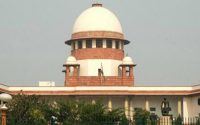Supreme Court ruling brings clarity on Article 370
Source – dnaindia.com
The Supreme Court’s reiteration that Article 370 — that grants special status to the state of Jammu and Kashmir — is essentially permanent and not a temporary statute may not affect any pending pleas, experts say.
Currently, the top court is adjudicating on several petitions including those that challenge Article 35A that empowers the state legislature of J&K to define “permanent residents” of the state and provide them with special rights and privileges.
The apex court’s observation made on Tuesday that Article 370 has acquired a permanent status by virtue of its existence for more than six decades, will definitely define the course of a batch of hearings pertaining to Article 35A, coming up on April 9.
Reliable sources have suggested that parties challenging Article 35-A are working in coordination to chalk out a joint strategy to put up a strong case in its support.
“All the petitions have been clubbed and will be heard by the Supreme Court on April 9,” said president of West Pakistan Refugees Action Committee Labha Ram Gandhi, one of the petitioners.
On October 30, a three-judge bench comprising Chief Justice of India Dipak Mishra, Justice Ajay Manikrao Khanwikar and Justice DY Chandrachud had deferred the hearing of petitions by three months following the submission by attorney general, KK Venugopal that the court proceedings would hamper the dialogue initiated by the centre’s interlocutor Dineshwar Sharma.
Article 35-A was added to the Constitution by a Presidential Order in 1954 and was extended to J&K through the Constitution (Application to Jammu and Kashmir) Order issued by President Rajendra Prasad.
It was specifically devised to grant protection to state subject laws that had already been defined under the Maharaja’s rule and notified in 1927 and 1932.
On Tuesday, the bench comprising Justices AK Goel and RF Nariman had reiterated an earlier stand that Article 370 was permanent. Their observations were made on the heels of a petition filed by Kumari Vijaylakshmi Jha who challenged a Delhi High Court order that said Article 370 was a temporary statue.
Article 370 of the Constitution, that granted J&K autonomy, was drafted as Part XXI of the Constitution: Temporary, Transitional and Special Provisions. The State’s Constituent Assembly was empowered to either apply it to the state or repeal it. However, when the Constituent Assembly dissolved itself without recommending the repeal of Article 370, it was deemed to have become a permanent feature of the Constitution.
The apex court had observed that Article 370 had acquired a permanent status over the years that would make repealing it difficult now. At least two SC judgments support this view including one authored by Justice Nariman.
Addressing Additional Solicitor General Tushar Mehta — who is representing the Centre — Justice Nariman submitted that he had already settled the question of law pertaining to Article 370 in February 2017 in the matter of SBI v/s Santosh Gupta. Justice Nariman added that he stood firmly by the observations made then and invited the Centre to submit its view on this issue within the next few weeks.
Senior advocate Arvind Datar agrees with Justice Nariman’s observation. “When a provision is in existence for more than six decades how can it not be permanent?”
“We have not done anything for 68 years. What are you going to achieve by deleting it now,” he added.



